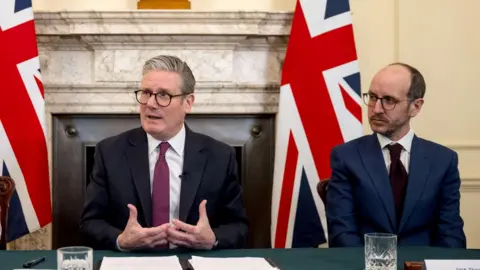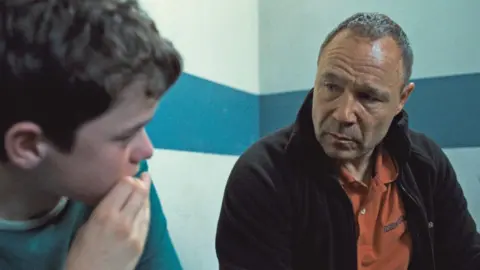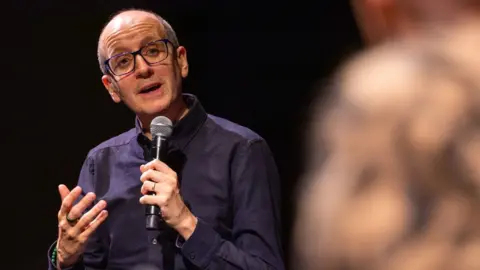Culture reporter
 Reuters
ReutersThe prime minister has told the makers of hit Netflix drama Adolescence that it was “really hard to watch” with his teenage children, as he hosted them in Downing Street to discuss the influence of toxic material online.
Sir Keir Starmer said the show, about a 13-year-old boy accused of murder, served as “a torch that shines intensely brightly on a combination of issues that many people don’t know how to respond to”.
But he warned there was not a “silver bullet response” or “some policy lever that can be pulled”.
The meeting came as Netflix said it would make the series available to screen for free in schools, a move Sir Keir welcomed as “an important initiative to encourage as many pupils as possible to watch the show”.
 Netflix
NetflixThe programme has sparked a national conversation about the impact of social media and “manosphere” influencers.
Jack Thorne, who wrote the show with actor Stephen Graham, recently said the prime minister should “rather urgently” consider a smartphone ban in schools and a “digital age of consent”, similar to Australia, which has passed a law banning children under 16 from using social media.
Thorne and producer Jo Johnson gave their views to Sir Keir at Monday’s meeting, along with selected charities and young people. Culture Secretary Lisa Nandy was also there.
The prime minister, who has a daughter aged 14 and a 16-year-old son, told them the show was “at times harrowing” but had “lit a touch paper” under the debate about the issues.
“To be honest, as a dad, I have not found it easy viewing,” he said.
“It instantly contacts with the fears and worries, not just of young people – because I was really struck by how riveted our children were to it – but also frankly the fears and worries of parents and adults across the country.”
But he told the attendees there was no single policy that could provide a simple solution.
“It is actually much bigger than that, almost a cultural issue,” he said.
He added that the show highlighted “the devastating effect of misogyny on our society”, plus “the dangers of online radicalisation and this sense of young people being on their own, very often in their bedroom or wherever, isolated with that online radicalisation”, and “the challenges our children, schools and families face every day”.
 Netflix
NetflixSpeaking afterwards, Thorne said it was a “brilliant” meeting.
“The brilliant thing was that it wasn’t about us,” he said. “It was about facilitating conversations with charities and youth groups who really understand what’s going on, and I hope a solution can be found to this problem.”
The success of Adolescence has helped those charities and groups get “the opportunity to have conversations that they haven’t had before and that they should have had, and that might lead to a policy change and things being made better for our young people”, he added.
The government pointed to measures including the Online Safety Act, which says social media companies will have to protect children from harmful material including pornography, material promoting self-harm, bullying and content encouraging dangerous stunts.
Platforms will be expected to adopt “age assurance technologies” to prevent children from seeing harmful content.
School screenings
The government is also updating its guidance on how schools should teach children about relationships, sex and health education (RSHE).
The Times recently reported that it would include “lessons to counter misogyny and the growing appeal of influencers such as Andrew Tate”, in the wake of the discussions about Adolescence.
Meanwhile, Netflix announced that the drama will be available to all UK secondary schools through the Into Film+ schools streaming service.
In a statement, Thorne said: “To have the opportunity to take this into schools is beyond our expectations. We hope it’ll lead to teachers talking to the students, but what we really hope is it’ll lead to students talking amongst themselves.”
Sir Keir denied a suggestion that showing the programme in schools would demonise boys who spend a lot of time online but haven’t ended up like Jamie in Adolescence.
“I think it’s probably wrong to think that there’s just a group of boys that are drawn to this [material],” the prime minister told BBC Radio 1’s Newsbeat.
“Certainly, there’s a group that are drawn to the extreme edges of this, and we see that in the drama, of course, but I think many boys would be somewhere, possibly, on a continuum here.”
Boys looking to belong ‘need an alternative option’
For 22-year-old Harry Foster, being radicalised as a teenager was “very easy”.
“When you’re a child, it’s very easy when there’s a lack of any sort of direction or positive role models to get swept along with something,” he said.
He said extremist groups exploited his vulnerability with addiction issues as a teenager, manipulating him into sharing racist and misogynistic views.
“I thought I was finding some sense of belonging,” he told Newsbeat. “What I was actually being given was a very harmful and very radical set of political views, which is almost like the trade-off for belonging to these people.”
He got help through The Warren youth group in Hull and now works with them to help other boys and young men in similar situations.
Harry welcomed Sir Keir’s plans to work with Netflix to show Adolescence in secondary schools, but said more work must be done.
“I don’t think there’s ever been a time where young people as a whole feel more disconnected from politicians,” he said.
“It’s one thing to make young men aware of the problems around these kind of ideologies, but it’s equally important we’re offering an alternative to young boys and men who are so desperately looking for something to identify with.
“I don’t think it’s as simple as showing a TV show. There needs to be a positive alternative for young people.”
www.bbc.com (Article Sourced Website)
#Adolescence #hard #watch #dad #Starmer #tells #makers

